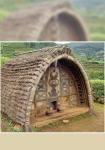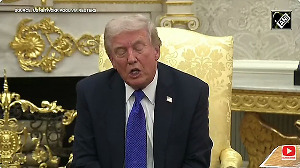All of them have been built with steel scrap from the World Trade Centre towers that collapsed in the September 11, 2001 terror attacks.
As the world mourned the fifth anniversary of 9/11 this Monday, the Nilambur Taluk Co-operative College in Malappuram stood testimony to the sturdy iron rods of the WTC towers.
It is not just the college, but several buildings across many towns in India have been constructed using the steel debris from the collapsed New York towers.
Take the case of the Co-operative College building at Nilambur in north Kerala's Malappuram district. The college building has been constructed using the iron rods of the WTC towers.
According to engineers who designed and constructed the building, around 180 pipes of four-inch thickness and eight-feet length have been used. "They were really very sturdy rods. The quality was superb; that is the reason why we used them. In fact, we did not know that they were from the WTC debris," K Ravi, a civil engineer who was part of the building team, said.
The civil contractor in charge of the college's construction bought the iron rods from Ralco, an engineering company based in Malappuram. A civil engineer in Ralco, who did not want to be named, said the company bought the rods from the WTC scrap that an engineering construction dealer had imported from a multinational company.
"We bought several trucks of the debris and supplied them across several construction sites in Kerala and Tamil Nadu," he said.
One reason why Ralco bought the WTC scrap was because of the quality of the rods. "We found them to be of great quality. And the price was very cheap because it was second-hand. It cost only Rs 25 per kg, whereas if you buy it from the market, it would cost you double that amount," the engineer added.
Construction company managers said the WTC scrap has been extensively used in the construction of several new buildings in the last four years.
Coimbatore-based Apex Constructions partner Alex Kuruvila said his firm has used the steel scrap in some buildings. "We recycled them, and found them to be much sturdier than similar Indian products," he said.
The buildings Apex Constructions used the steel scrap for include a car storage yard, an apartment and several small and medium shopping arcades in and around Coimbatore.
Tonnes of the steel scrap from the destroyed towers reached India within six months of the tragedy.
Kuruvila bought the steel scrap from Chennai-based importer Sabari Exim Private Ltd.
Sabari was the first company in India to import the WTC steel scrap from a New York-based scrap processing firm for $120 (about Rs 4,600) per tonne.
The Indian Steel Alliance, an industry lobby of steel makers, estimates that scrap processing companies across India -- from Coimbatore, Chennai, Kolkata, Ahmedabad to Ludhiana -- imported nearly 50,000 tones of the WTC steel wreckage.
Environmentalists and activists at that time alleged that the WTC scrap had hazardous waste and should not be imported.
They alleged that some Indian companies were importing hazardous wastes like scrap steel, zinc ash and other toxic and lead-bearing materials to the country flouting all norms and health concerns.
Greenpeace, which campaigned against the import, argued that the WTC wreckage could not be treated as ordinary steel scrap because everything in the Twin Towers including mercury-containing tube lights, carcinogenic asbestos insulation, PVC articles and computers were incinerated after 91,000 litres of jet fuel ignited in the buildings.
After the first batch of the WTC shipment reached India in 2002, Greenpeace, other environmental and trade unions wrote to the US embassy in New Delhi to stop the export of the WTC scrap.
Environmental and trade union groups led by Greenpeace India demanded that the scrap be shipped back to the US as they were contaminated.
But Indian importers insisted that the WTC debris did not contain hazardous materials as it had been tested by US environmental and medical agencies. Indian scrap importers also sent samples of the scrap to SAS Global Services, a renowned testing house, to examine whether it contained harmful substances.
The controversy soon died down and importers sold the scrap across India, especially to construction companies.
Today, several buildings across India, like the Nilambur Taluk Co-operative College in Malappuram, stands as memorials to the collapsed WTC twin towers.





